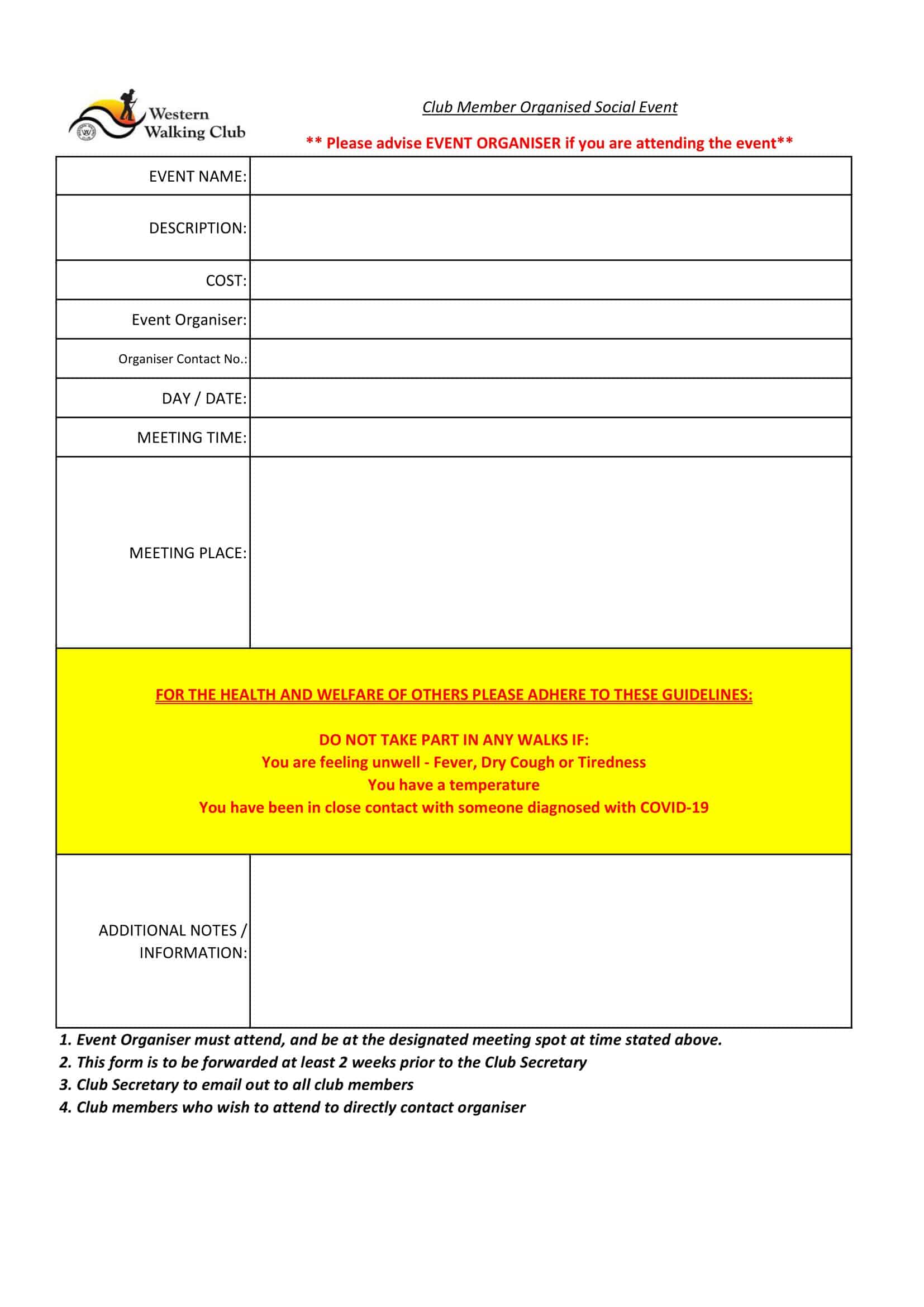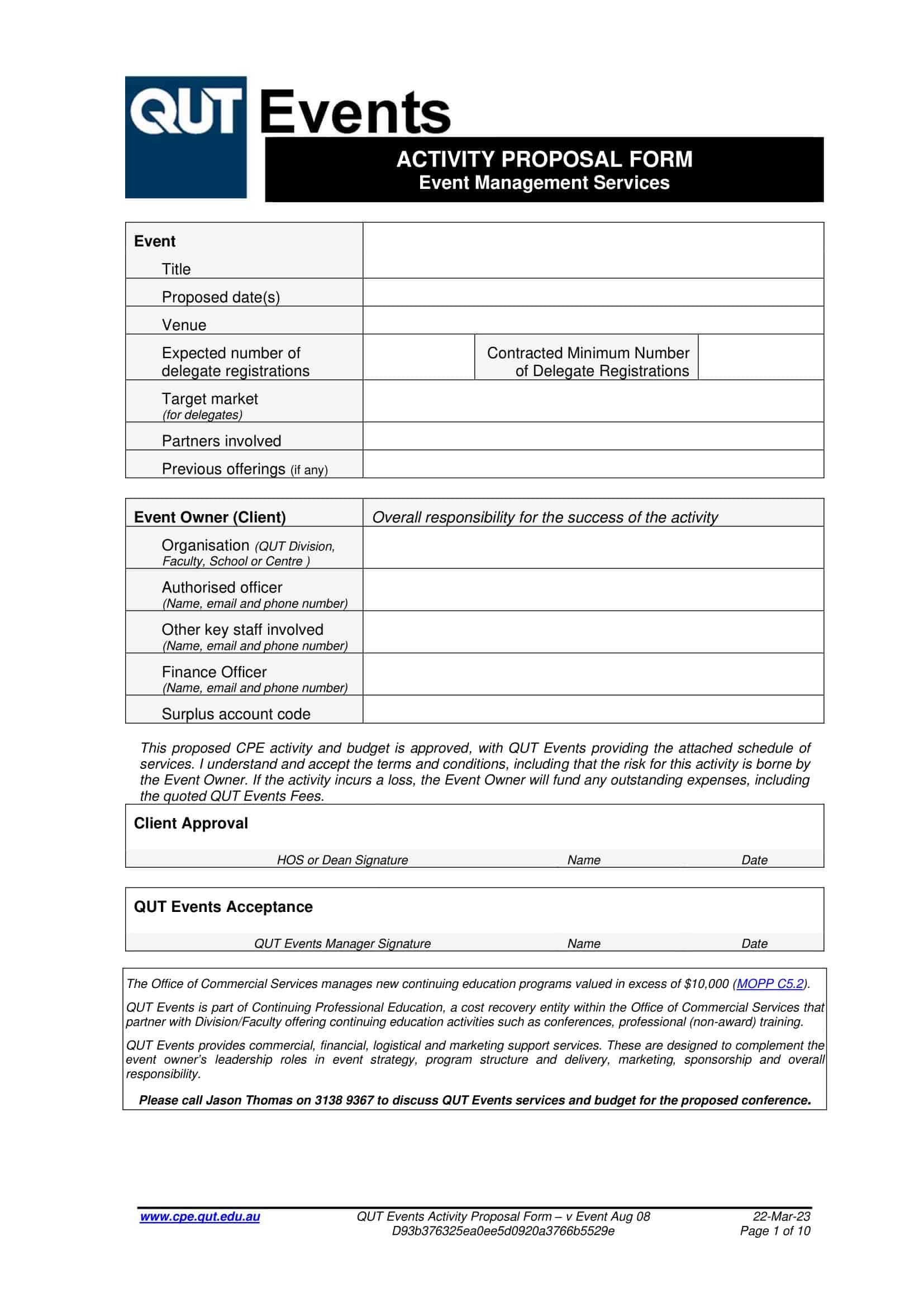An event proposal is a written document outlining the details of a proposed event, including its purpose, goals, target audience, and plan for execution. It is a crucial step in the planning process as it serves as a roadmap for ensuring the success of the event.
This article will provide a comprehensive guide on how to write an effective event proposal, covering all the key elements that should be included and tips for making a compelling case to stakeholders. Whether you are proposing a small gathering or a large-scale event, the information in this article will help you create a proposal that will impress and persuade.
Table of Contents
Event Proposal Templates
Event Proposal Templates are documents that help event planners pitch their ideas and plans to potential clients or stakeholders. They typically include details about the event’s purpose, scope, budget, timeline, marketing strategy, and other important elements. Using an Event Proposal Template can help streamline the process of creating a professional and persuasive proposal, while also ensuring that all necessary information is included. Whether you’re organizing a corporate conference, a wedding, or a community festival, an Event Proposal Template can be a valuable tool to help you secure funding, support, and participation for your event.
What should an event proposal include?

An event proposal typically includes the following elements:
Introduction: A brief overview of the event and its purpose.
Objectives: Clearly defined goals and outcomes for the event.
Target Audience: A description of the people the event is aimed at and why they are important.
Event Description: A detailed description of the event, including its format, location, date, and time.
Budget: An estimated budget for the event, including costs for venue, equipment, staffing, and marketing.
Marketing and Promotion: A plan for how the event will be marketed and promoted to reach the target audience.
Evaluation and Follow-Up: A plan for measuring the success of the event and follow-up actions.
Conclusion: A brief summary of the key points in the proposal.
It’s important to make sure the proposal is well-organized, clear, and concise, and presents a compelling case for why the event is necessary and worth supporting.
Who needs to write an event proposal?
Event proposals are typically written by event planners, marketers, or other professionals responsible for organizing events. The proposal can be written by an individual or a team, depending on the size and complexity of the event. It can also be written by an external event planning company that is bidding to plan and execute an event for a client.
In short, anyone who is proposing an event, regardless of whether it’s a small gathering or a large-scale event, will need to write an event proposal to present their ideas, plans, and budget to stakeholders for approval and support.
Sample of events where you may need an event proposal
Examples of events where an event proposal may be necessary include:
Corporate events: Conferences, trade shows, product launches, and other business-related events.
Fundraising events: Galas, auctions, and other events organized for the purpose of raising money for a charity or nonprofit organization.
Social events: Wedding receptions, birthday parties, and other events for family and friends.
Community events: Festivals, parades, and other events aimed at bringing people in a community together.
Cultural events: Concerts, theater performances, and other events showcasing the arts.
Sporting events: Marathons, tournaments, and other athletic events.
Educational events: Workshops, seminars, and other events aimed at sharing knowledge and skills.
Political events: Campaign rallies, political conventions, and other events aimed at promoting a political cause or candidate.
Religious events: Religious festivals, retreats, and other events aimed at promoting and celebrating religious beliefs.
Trade events: Expos, exhibitions, and other events aimed at promoting and showcasing products and services within a particular industry.
Environmental events: Earth Day events, sustainability workshops, and other events aimed at promoting environmental awareness and conservation.
Health and wellness events: Yoga classes, healthy cooking demonstrations, and other events aimed at promoting physical and mental wellness.
Food and beverage events: Food and drink festivals, cooking classes, and other events centered around food and drink.
Travel events: Tourism fairs, travel expos, and other events aimed at promoting travel and adventure.
How to write an event proposal
Here are the steps of writing a perfect event proposal
Step 1: Conduct Initial Research
Before you begin writing the proposal, research the event and the target audience to determine the best approach for your proposal. Look for similar events that have been held in the past and consider what worked well and what could have been improved.
Step 2: Define Objectives and Goals
Define the goals and objectives of the event, and make sure they are clear and specific. Consider why the event is important, what you hope to achieve, and who you hope to reach. This will help you stay focused as you develop the rest of the proposal.
Step 3: Determine Target Audience
Determine who the target audience is for the event, and consider what they want and need. Think about the demographics, interests, and behaviors of the people you hope to reach, and how you can make the event appealing to them.
Step 4: Describe the Event
Describe the event in detail, including the format, location, date, and time. Consider the size of the event, the number of attendees you expect, and any special requirements, such as equipment, staff, or permits.
Step 5: Develop a Budget
Develop an estimated budget for the event, including all of the costs associated with the event, such as venue rental, equipment, staff, marketing, and other expenses. Make sure the budget is realistic and feasible, and consider ways to reduce costs where possible.
Step 6: Plan Marketing and Promotion
Develop a plan for how you will market and promote the event to reach the target audience. Consider the best channels for reaching the target audience, such as social media, email marketing, or print advertising.
Step 7: Evaluate and Follow-Up
Plan for how you will evaluate the success of the event, and consider what follow-up actions you will take. This could include surveying attendees, analyzing data, or making improvements for future events.
Step 8: Write the Proposal
Write the proposal, making sure to clearly and concisely present the information in a well-organized format. Start with an introduction that provides an overview of the event and its purpose, and then provide the details of the event, including the objectives, target audience, event description, budget, marketing and promotion, evaluation and follow-up, and conclusion.
Step 9: Review and Revise
Review the proposal thoroughly and make any necessary revisions. Check for spelling and grammar errors, and make sure the proposal is clear and concise.
Step 10: Present the Proposal
Present the proposal to stakeholders, such as sponsors, partners, or decision-makers, to gain approval and support. Be prepared to answer questions and address any concerns.
These are the basic steps for writing an event proposal, but the exact details will vary depending on the type and size of the event. The key is to make sure the proposal is well-organized, clear, and concise, and presents a compelling case for why the event is necessary and worth supporting.
Tips for writing an event proposal
Here are a few tips for writing an effective event proposal:
Be clear and concise: Make sure the proposal is easy to read and understand, and avoid using jargon or technical terms that the reader may not be familiar with.
Focus on the benefits: Emphasize the benefits of the event, both for the target audience and for any stakeholders, such as sponsors or partners. Make sure it is clear how the event will meet the needs of the target audience and achieve the goals and objectives set out in the proposal.
Be realistic: Make sure the proposal is feasible and realistic, and avoid overpromising. Consider the costs, resources, and time required for the event, and make sure the budget is realistic and feasible.
Use supporting materials: Use diagrams, graphs, and other supporting materials to help illustrate the proposal and make it more compelling. This could include samples of marketing materials, floor plans, or photos of similar events.
Be professional: Make sure the proposal is well-written, free of errors, and presents a professional image. Consider using a template or a professional service to help ensure the proposal is polished and professional.
Tailor the proposal to the reader: Consider the needs and expectations of the reader, and tailor the proposal to meet those needs. This could include highlighting the benefits of the event for the reader, addressing any potential concerns, or providing additional information as needed.
Follow up: After submitting the proposal, be sure to follow up with the reader to ensure they received it and to answer any questions they may have. If the proposal is rejected, ask for feedback and consider making revisions before resubmitting.
These are a few tips to help you write an effective event proposal. The most important thing is to be clear, concise, and compelling in your proposal, and to make sure it meets the needs of the target audience and achieves the goals and objectives set out in the proposal.
FAQs
What is the purpose of an event proposal?
The purpose of an event proposal is to secure funding, resources, and support for an event. It is used to communicate the details and goals of the event to stakeholders, such as sponsors or partners, and to convince them to support the event.
How long should an event proposal be?
An event proposal can vary in length, but typically it should be around 2-10 pages long. The length of the proposal will depend on the complexity and size of the event, and the amount of detail required to effectively communicate the event’s goals and objectives.
What is the difference between an event proposal and an event plan?
An event proposal is a document used to secure funding, resources, and support for an event, while an event plan is a more detailed document that outlines the specifics of how the event will be executed, including the schedule, logistics, and staffing. An event proposal is a high-level overview of the event, while an event plan is a more detailed plan for executing the event.
How do I make my event proposal stand out?
To make your event proposal stand out, you can include supporting materials, such as photos, diagrams, or videos, to help illustrate the event and make it more compelling. You can also use a creative and visually appealing format to make the proposal more appealing. Additionally, highlighting the benefits of the event for the target audience and stakeholders, and demonstrating how the event will meet their needs, will make the proposal more compelling and increase the chances of it being accepted.
What is the typical response time for an event proposal?
The typical response time for an event proposal can vary depending on the size and complexity of the event, and the organization receiving the proposal. Generally, it can take anywhere from a few days to several weeks to receive a response. If you haven’t received a response within a reasonable amount of time, it’s a good idea to follow up with the organization to inquire about the status of your proposal.
How do I follow up after submitting an event proposal?
To follow up after submitting an event proposal, you can reach out to the organization by email or phone to inquire about the status of your proposal. If the proposal has been accepted, you can start planning and preparing for the event. If the proposal has been rejected, you can ask for feedback and consider making revisions before resubmitting the proposal.

























































![Free Printable Roommate Agreement Templates [Word, PDF] 1 Roommate Agreement](https://www.typecalendar.com/wp-content/uploads/2023/06/Roommate-Agreement-150x150.jpg)
![Free Printable Credit Card Authorization Form Templates [PDF, Word, Excel] 2 Credit Card Authorization Form](https://www.typecalendar.com/wp-content/uploads/2023/06/Credit-Card-Authorization-Form-150x150.jpg)
![Free Printable Stock Ledger Templates [Excel,PDF, Word] 3 Stock Ledger](https://www.typecalendar.com/wp-content/uploads/2023/08/Stock-Ledger-150x150.jpg)
